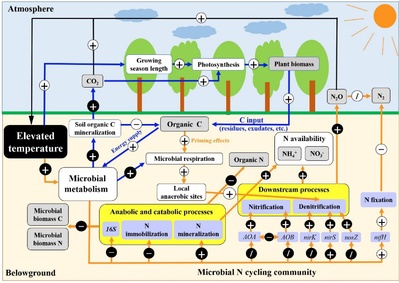Elevated temperatures influence soil N cycling in the global scale
The research team led by Prof. XU Jianming from the College of Environmental and Resource Sources published an article entitled “Elevated temperature shifts soil Nitrogen cycling from microbial immobilization to enhanced mineralization, nitrification and denitrification across global terrestrial ecosystems” in the Global Change Biology on July 2, 2020.
Our planet is plagued by severe global warming currently. Since the dawn of the 20th century, the average surface temperature has risen 0.9°C and there has been a more remarkable increase in some polar regions. The warmer climate has contributed to the melting of icebergs, the rise of the sea surface, the high frequency of extreme weather and the decline of biodiversity, which have therefore exerted a tremendous impact on production and life for mankind.

As an integral component of the terrestrial ecosystem, soil microbes are the major driving force for soil transformation and element cycling. Soil N pool sizes and fluxes, N availability for plants and N2O emissions in terrestrial ecosystems are undoubtedly affected by microbially mediated N cycling. When there is an imbalance in N supply, the primary productivity of terrestrial ecosystems will be severely constrained; when N is converted from ammonium to nitrate, soil acidification and N losses will be incurred, thereby contaminating groundwater; emissions of N2O will not only result in the waste of N resources but also accelerate global warming and the destruction of the ozone layer. Nonetheless, the mechanisms by which various microbially mediated N cycling processes respond to climate warming at the global scale remains obscure.
The research team led by Prof. XU Jianming report that elevated temperatures significantly decreased soil microbial biomass N in terrestrial ecosystems, increased the rates of soil N mineralization, nitrification and denitrification, and promoted the emission of N2O. This study suggests that rising temperatures will reduce the utilization rate of N in soil microbes and lead to the shift of microbial N cycling from the homogeneous process to the heterogeneous process. When the temperature rises, the ability of microbes to convert N obtained from the environment into their own constituent will be reduced whereas the process of converting synthesized substances into small molecules and releasing energy will be enhanced. Meanwhile, rising temperatures will decrease the amount of microbial C in terrestrial ecosystems immensely and induce the emissions of CO2. The positive correlation between CO2 emissions and N mineralization, denitrification and N2O emissions displays a coupling mechanism in microbially-driven C and N cycling processes against the backdrop of global warming.
These patterns are intimately bound up with microbial metabolism, enzyme activities and plant C inputs. Under warming conditions, soil microbes need to produce more energy to maintain their metabolic process, thereby causing the decline of the utilization rate of C and N. In the meantime, enzyme activities related to N cycling will also increase correspondingly with the rise of the temperature. These will lead to a shift from the homogeneous process to the heterotrophic process. Furthermore, rising temperatures will promote the growth period of plants and the biomass, which will contribute to the increasing input of photosynthetic C into soil. It will stimulate the mineralization of organic matter and organic N in soil and give rise to an anaerobic microsite which would speed up the denitrification process.
This study reveals that elevated temperatures produce a dramatic impact on global N cycling processes with implications of a positive feedback to global climate and emphasizes the close link between soil microbial C and N cycling.